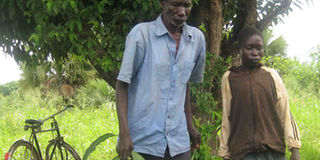Despair as mental symptoms take toll on nodding children

Mr Micheal Obwoya tends to his grandson Morris Ocitti, 18, in Tumangu Village, Akwang Sub-county in Kitgum District. Ocitti started nodding and getting seizures in 1997. PHOTO BY HARRIET ANENA
What you need to know:
From nodding to seizures, parents of nodding disease patients in Acholi Sub-region are now grappling with mental symptoms, which make victims aggressive and seclusive.
Kitgum
Denis Oloya was an active child, he loved going to school and was polite. His mother, Nighty Alal Ochola, recalls those tender memories about her son, with a smile on her face.
However, all that changed in 2003, when after returning from school, Oloya started nodding when Ochola gave him food. “I thought he was just tired after school but the nodding continued,” Ochola says.
By the end of 2004, Oloya was getting frequent nodding and experiencing seizures.
That is when the family took him to the village health centre where he was given epilepsy drugs to calm the nodding and seizures. “Nothing much changed, but we continued giving him the medicine,” Ochola says.
Today, she has to bathe Oloya, now 20-years-old (who eases on himself whenever he gets seizure attacks), dresses him up and ensures that he is closely monitored.
This is because of the unstable mental condition that Oloya, like thousands of other nodding disease victims, are facing.
What is worrying more, is Oloya’s condition also affects residents of Tumangu Village, Akwang Sub-county in Kitgum District. “He has become so aggressive, he insults people and undresses in public,” says Ochola. She says this happens before or after nodding or seizure attacks. She adds: “He walks about in the village, shouting ‘I have a wife, come and see her’. His head does not work.”
Ochola says neighbours have become fearful of her son, whom they think, could one day rape a woman in the area. The government has been providing medicine to manage symptoms of the nodding disease among children in Acholi Sub-region. Some have registered reduced attacks of nodding and seizures.
However, like Ochola, parents are now battling mental symptoms of nodding disease in their children, most of whom have become aggressive, abusive and withdrawn.
In Okidi Village, Amida Sub-county, Christine Akwero, is struggling to contain the movement of her 18-year-old daughter, Vicky Achiro.
Achiro is known through out the village because of her constant wanderings. She usually returns home with bruises and wounds after getting seizure attacks. “The disease has damaged her head. She abuses people and walks around the village,” Akwero says, who had turned up at a meeting of nodding patients and parents at Okidi Health Centre II, Kitgum District Saturday.
At the meeting, Achiro gets hold of each visitor, shakes their hands for about two minutes as she smiles and utters phrases thus; ‘I know you, you are welcome, you are my mum’.
The medical superintendent of Kitgum hospital, Dr Alex Layoo, while speaking to a group of American researchers and psychiatrists, said it is true some patients have improved after the medication, but the mental symptoms still remain.
He said more research needs to be done on the nodding disease, if a sustainable solution is to be got soon. “It is a big problem that is threatening the existence of families,” he said of the nodding disease that he calls “a medical insecurity”.
Dr Catherine Abo, a psychiatrist at Butabika Mental Hospital, yesterday said unless the cause and treatment of the disease is known, it is difficult to ascertain if the mental symptoms can be cured.
A new WHO report puts the number of nodding disease victims at 7, 000, but the Ministry of Health puts the figure at about 3,500.




